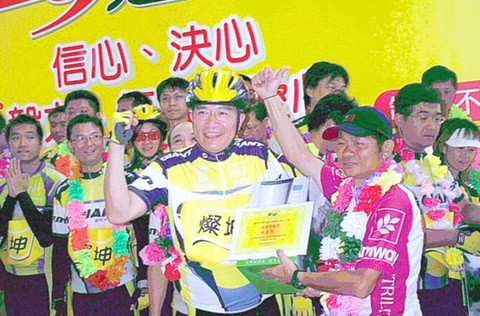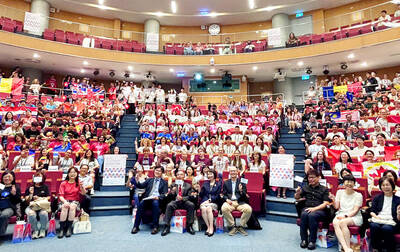Two weeks ago on May 3, Tsann Kuen Group's (
No one would have suspected that the nation's largest home appliance and consumer electronics chain was facing a crisis -- that the Taiwan Stock Exchange (TSE) had decided to restrict trading in Tsann Kuen shares to cash transactions only as of May 5.
Tsann Kuen, listed on Taiwan's main bourse, was required by law to submit its financial statements for last year to the nation's stock regulator as of May 2.

TAIPEI TIMES FILE PHOTO
But the company failed to pass the auditing of its financial statements on time, because its certified public accountant in China, Deloitte & Touche, declined to fully endorse the company's financial figures.
Instead, the accounting firm issued a "qualified opinion" in a report, indicating some reservations about a pending verification process involving a total of 62 million yuan (US$7.75 million) in accounts payable at Tsann Kuen's defunct subsidiary in Xiamen, Fujian Province.
That meant the TSE would have to reclassify Tsann Kuen shares as requiring full delivery, meaning that investors would not be able to buy shares in margin trading.
The TSE move had a domino effect, as investors tossed their holdings of Tsann Kuen shares, causing the stock to tumble by the 7 percent daily limit for the next three days, despite the company's emphasis that its defunct Chinese subsidiary should not affect its business in Taiwan.
The crisis was finally resolved five days later when Tsann Kuen submitted its auditing report -- fully endorsed by its accountants -- and the TSE said on May 9 that the company could resume normal trading soon.
This incident, however, served as a reminder to investors of how a retailing giant could triumph at home, but encounter a Waterloo in China.
Wal-Mart dream
On April 26, 2003, Tsann Kuen Trans-Nation Group (燦坤跨國集團), the parent company of Tsann Kuen Group, extended its kingdom across the Taiwan Strait and celebrated the opening of its first outlet in Shanghai.
At the time, Wu Tsann-kuen (
Wu launched an expansion spree and soon Tsann Kuen's trademark yellow buildings had become a well-known sight in China, as they are in Taiwan.
The yellow buildings, which numbered more than 50 at one point, however, did not last long.
Tsann Kuen's lofty dream was shattered last year as the company announced it would sell all 35 outlets and inventories in China to local rival Yongle Electric Appliance Co (永樂家電), China's third-largest home appliances retailer, for 143.8 million yuan after suffering a loss of 87.6 million yuan.
Many said Tsann Kuen was wise to exit the Chinese market, but the loss has cost its parent company dearly.
Tsann Kuen reported pre-tax earnings of NT$600 million last year, a 58 percent decline from 2004. Losses incurred from intangible assets, however, are inestimable.
Rash expansion
Drooling at the massive Chinese market and that nation's soaring purchasing power, a huge number of Taiwanese companies have been banking on China, believing that they can bring home boatloads of money given their language and cultural advantages compared to other foreign firms.
Many of them either end up withdrawing as Tsann Kuen did, or enjoy a degree of success after years of effort, such as Zhen Quo Cafe (
But whenever people talk about Taiwanese companies slipping up in the Chinese market, Tsann Kuen is the oft-cited example because it expanded so fast and collapsed so quickly.
"The so-called `Taiwan experience' will not necessarily work in China," said Beryl Lee (李培芬), secretary-general of the Association of Chain and Franchise Promotion (連鎖加盟促進協會). "To hit a home run in the [China] market is not a no-brainer, as many people have thought."
Many Taiwanese companies have tried to duplicate their business models in China, but one size does not fit all, especially in the huge Chinese market with different retailing environments, preferences and shopping behaviors in its myriad regions.
Tsann Kuen made the same mistake.
Bargaining culture
A membership system, price guarantees and quality service have been the secrets of Tsann Kuen's success in Taiwan. But the first two are not conducive to doing business in China, given that nation's deep-rooted bargaining culture.
"Chinese buyers bargain for almost everything, and they enjoy the process," said Ethan Chen (陳建文), who used to work at the Shanghai operation of a Taiwanese high-tech company.
So while Chinese electronics vendors put price tags on their products, buyers always walk out having paid lower prices, which made it hard for Tsann Kuen to implement its lowest price policy.
With its neat displays and bright rooms, Tsann Kuen did manage to attract a large number of window shoppers, Chen said.
Instead of making purchases, however, "Many were there to compare the product lines and prices, or just to enjoy the cool air conditioning, and would then buy in Gome Electrical Appliances Holdings Ltd (國美電器控股) a couple of blocks away," he said.
Gome is China's largest electronics retailer and is 50 percent owned by the government. It always tries to offer the lowest prices, Chen said.
Service, both in-store and after-sales, which Tsann Kuen is proud of, did not impress Chinese customers as the training of the company's Chinese service staff failed to keep pace with the company's rapid expansion.
Tsann Kuen's position as a one-stop electronics store also failed to appeal to Chinese customers, as they are accustomed to shopping for TVs and air conditioners at home appliance retailers such as Gome and Suning Appliance Co (蘇寧電器), and to buying digital music players and cellphones in information-technology malls.
One contribution Tsann Kuen did make in China was to introduce tidy, bright and customer-friendly showrooms. However, its competitors, especially Yongle, were quick to emulate the Taiwanese model.
Controversial figure
The kingpin in Tsann Kuen's rise and fall is certainly the group chairman, Wu Tsann-kuen.
Wu, 55, started his company as a small, original equipment manufacturer (OEM) in Tainan with just NT$5,000 in 1976, and built it into the nation's largest 3C (computer, communication, consumer electronics) retailer.
Many have called Wu a daring gambler, but it took more than just boldness to establish his empire.
Like many local entrepreneurs, Wu went door-to-door visiting clients in the early days to win orders from big-name companies.
Later Wu progressed from being an OEM to supplying products under the company's own brand name, "EUPA."
These products, which included electric irons and coffee makers, were based on years of observation of consumer behavior in different countries, combined with fashion elements.
After claiming dominance in the local distribution sector with the Tsann Kuen retail chain, Wu used the lowest price guarantee policy to win customers by demanding suppliers such as Acer Inc cut prices, or he would remove their products from his shelves.
The competition between Tsann Kuen and its local rivals became so fierce that in the summer of 2003 the company decided to boycott Acer computers because Acer's retail arm, E-Life Mall Co (全國電子), sold Acer personal computers at lower prices than Tsann Kuen.
Wu's success only fed his ambition and, some say, aggression. His eagerness to conquer the world also led him into legal difficulties.
At the end of 2004, Wu was indicted on charges of fraud and violating the Securities and Exchange Law (
In January last year, Wu was sentenced to one year and six months in prison for violating the Securities and Exchange Law for having authorized his assistant to attempt to manipulate the share prices of smaller local rival Sunfar Computer Co (
Wu wanted to invest in Sunfar at NT$20 per share, a price Sunfar believed was way too low. The company had debuted on the over-the-counter GRETAI Securities Market at NT$72 per share.
Despite Tsann Kuen's China missteps and legal woes, many observers think the company's setback will be temporary. Suppliers such as Acer and Synnex Technology International Corp (聯強國際) have given their firm support to the company, while a seven-member banking consortium said it would honor an NT$3.3 billion loan signed on April 17.
Given his reputation as an audacious gambler, Wu is unlikely to remain content with what he has already achieved, and will, without a doubt, shake up the market the Tsann Kuen way once again.

TAIWAN IS TAIWAN: US Representative Tom Tiffany said the amendment was not controversial, as ‘Taiwan is not — nor has it ever been — part of Communist China’ The US House of Representatives on Friday passed an amendment banning the US Department of Defense from creating, buying or displaying any map that shows Taiwan as part of the People’s Republic of China (PRC). The “Honest Maps” amendment was approved in a voice vote on Friday as part of the Department of Defense Appropriations Act for the 2026 fiscal year. The amendment prohibits using any funds from the act to create, buy or display maps that show Taiwan, Kinmen, Matsu, Penghu, Wuciou (烏坵), Green Island (綠島) or Orchid Island (Lanyu, 蘭嶼) as part of the PRC. The act includes US$831.5 billion in

‘WORLD WAR III’: Republican Representative Marjorie Taylor Greene said the aid would inflame tensions, but her amendment was rejected 421 votes against six The US House of Representatives on Friday passed the Department of Defense Appropriations Act for fiscal 2026, which includes US$500 million for Taiwan. The bill, which totals US$831.5 billion in discretionary spending, passed in a 221-209 vote. According to the bill, the funds for Taiwan would be administered by the US Defense Security Cooperation Agency and would remain available through Sept. 30, 2027, for the Taiwan Security Cooperation Initiative. The legislation authorizes the US Secretary of Defense, with the agreement of the US Secretary of State, to use the funds to assist Taiwan in procuring defense articles and services, and military training. Republican Representative

Taiwan is hosting the International Linguistics Olympiad (IOL) for the first time, welcoming more than 400 young linguists from 43 nations to National Taiwan University (NTU). Deputy Minister of Education Chu Chun-chang (朱俊彰) said at the opening ceremony yesterday that language passes down knowledge and culture, and influences the way humankind thinks and understands the world. Taiwan is a multicultural and multilingual nation, with Mandarin Chinese, Taiwanese, Hakka, 16 indigenous languages and Taiwan Sign Language all used, Chu said. In addition, Taiwan promotes multilingual education, emphasizes the cultural significance of languages and supports the international mother language movement, he said. Taiwan has long participated

The paramount chief of a volcanic island in Vanuatu yesterday said that he was “very impressed” by a UN court’s declaration that countries must tackle climate change. Vanuatu spearheaded the legal case at the International Court of Justice in The Hague, Netherlands, which on Wednesday ruled that countries have a duty to protect against the threat of a warming planet. “I’m very impressed,” George Bumseng, the top chief of the Pacific archipelago’s island of Ambrym, told reporters in the capital, Port Vila. “We have been waiting for this decision for a long time because we have been victims of this climate change for